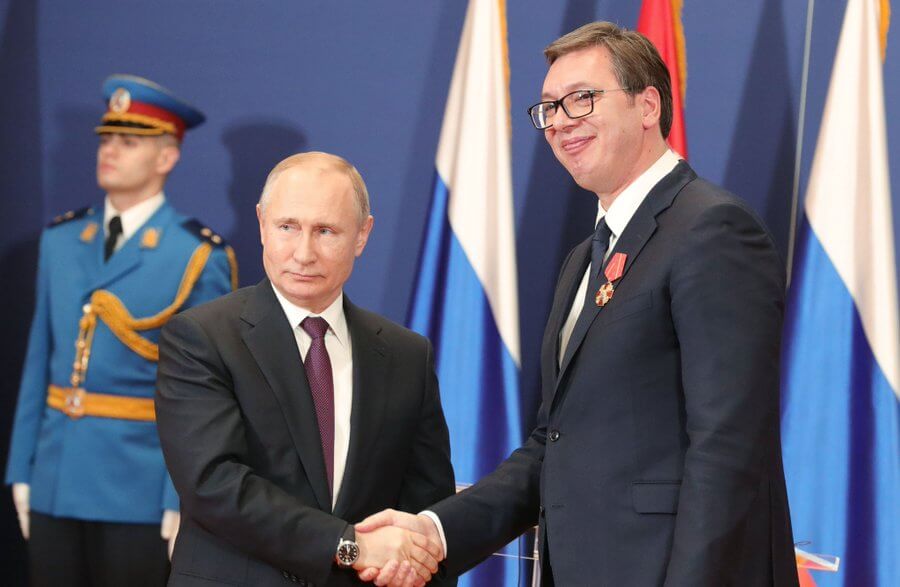Following a phone conversation with his Russian counterpart Vladimir Putin on Sunday, Serbian President Aleksandar Vučić declared that Russia will continue to supply natural gas “uninterrupted” for the next three years.
“What I can tell you is that we have agreed on the main elements that are very favourable for Serbia,” Vučić told reporters, expressing hope that Belgrade “will get an honest price” for Russian natural gas, which is currently three times cheaper than the rest of Europe.
🇷🇺🇷🇸📞 President Vladimir Putin and Serbian President Aleksandar Vučić spoke over the phone.
— MFA Russia 🇷🇺 (@mfa_russia) May 29, 2022
Both leaders confirmed their commitment to keep strengthening #RussiaSerbia strategic partnership based on traditionally close ties between the two peoples.
🔗 https://t.co/G1A0ds5cGH pic.twitter.com/r60170Z2Vu
According to Russian state-owned media outlet TASS, both leaders discussed “steps to expand mutually beneficial trade and economic cooperation,” and “consistently” boost their strategic partnership. “The sides continued an exchange of opinions on a number of international issues: the situation in Ukraine and the developments around Kosovo,” the Kremlin press office added in a statement. Vučić told Putin that he wished “peace would be established as soon as possible” between Russia and Ukraine.
The gas agreement is likely to be signed in early June, when Russian Foreign Minister Sergey Lavrov visits Serbia. Serbia’s 10-year gas supply contract with Russian state-owned energy company Gazprom expires tomorrow. However, it is unclear how Russia will supply gas in case the European Union (EU) decides to shut down all the gas pipelines in the next package of sanctions.
Since 2008, Gazprom Neft and Gazprom have held the majority stake in Serbia’s only oil company; Gazprom is also the majority stakeholder in Serbia’s singular gas storage facility. In this regard, Vučić has announced the building of more gas storage centres in the near future.
Though Serbia has supported Ukraine’s territorial integrity and offered humanitarian aid, it has not explicitly condemned Russia’s invasion of Ukraine. Despite increasing pressure from the West, Belgrade has refused to sanction Moscow till now. “We are living under pressure every day. […] As long as we can stand it, we will conduct an independent and sovereign policy,” Vučić admitted yesterday.
Sergei Lavrov is set to visit Belgrade in early June
— Samuel Ramani (@SamRamani2) May 30, 2022
This underscores Serbia's standing as Russia's main gateway to Europe and will result in Serbia formalizing its new 3 year energy supply agreement with Russia
Similarly, last week, the Serbian President stressed that Belgrade does not follow a pro-Western or pro-Russian policy. “Serbia has its own policy,” Vučić declared, adding, “I always say that we pursue our own interests and fight for our own interests.”
He has claimed that Serbia harbours ambitions of becoming an EU member and building ties with the United States (US), while also maintaining an advantageous bilateral relationship with Russia. However, the West wants Serbia to recognise Kosovo and to break all ties with Moscow in order to become a part of the EU.
Some Serbian leaders feel that Serbia should abandon its goal of joining the EU and resist all pressure from the West. “The agreement reached by President Vučić with President Putin is proof of how much Serbia’s decision not to participate in anti-Russian hysteria is respected,” Interior Minister Aleksandar Vulin, who is known to be pro-Russian, remarked, adding that Vučić makes “decisions that are good for Serbia and does not accept orders” from the West. In the past few years, western Serbia has also condemned Belgrade’s growing ties with Beijing.
The decision to sign a new gas deal with Russia comes amid massive protests from pro-Russian citizens last month, who felt that the Serbian government was distancing itself from Russia in light of the Ukraine war. Thousands marched from the city centre in Belgrade to the Russian embassy; they played the Russian and Serbian national anthems while chanting “No NATO” and “Serbians and Russians are brothers.” In fact, recent surveys indicate that a majority of the population wants to form a union with Russia, instead of the EU.
However, the country has simultaneously faced numerous bomb threats that government sources say are due to Serbia’s reluctance to align with the EU against Russia. Last month, Serbia was also considering buying Rafale jets from France and used planes from another country, in a move that was seen as Belgrade detaching itself from long-time military supplier Moscow.
Serbia secures gas deal with Russia, ignoring EU sanctions — Pres Vučić has refused to condemn Russia’s invasion of Ukraine, and has not joined Western sanctions, after years of Vučić cementing ties with Putin, whose policies he has adopted over Serbia https://t.co/KDKAzjwPHP
— Alfons López Tena 🦇 (@alfonslopeztena) May 29, 2022
Nevertheless, after Vučić was re-elected on April 3, he had declared that “Serbia will try to preserve friendly and partnership relations in many areas with the Russian Federation” while maintaining a policy of “military neutrality” over the Ukraine war—a policy he claimed was important to the US and Europe.
Serbia signed the United Nations (UN) resolution condemning Russia’s invasion of Ukraine but has refused to impose any sanctions on Moscow or place any limits on Russian energy imports. Belgrade sees Moscow as a strategic ally, as it continues to back Serbia’s claims on Kosovo, a partially recognised de-facto state.

